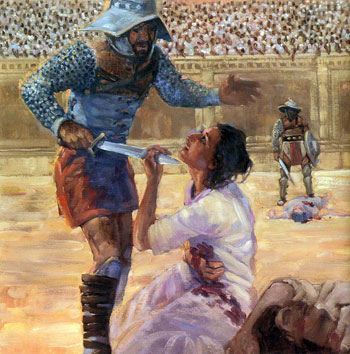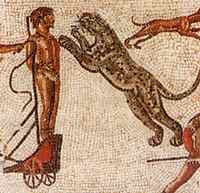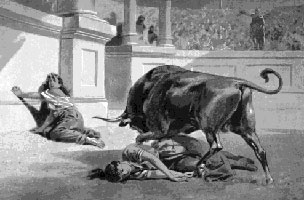August/
September 2018 - Vol. 99

Perpetua's
Victory
Over Death
.
The heroic witness of the
early Christian martyrs
Perpetua was a young lady who had it made.
She was born into a noble Roman family in
Carthage, a Roman city in North Africa in 181
AD. She was beautiful, well-educated, happily
married around the age of twenty, and now the
mother of an infant son. And then to the
surprise of her family she decided to become a
Christian. This appeared sheer nonsense to her
father who saw it as breaking not only with
Roman tradition but with family loyalty as
well. Besides, what good had Christianity
brought to Roman society? It seemed to mainly
attract working class people and the slaves
who had little or nothing to lose. Many
emperors had tried to suppress it in the past,
and the current emperor Septimus had decided
to outlaw it once again, and threatened death
to anyone who professed it.
The threat of death did not deter Perpetua
from taking instructions in the Christian
faith. She discovered that the Gospels were
true and offered the way to eternal life and
happiness. Jesus of Nazareth became a real
living person to her, someone greater than the
emperor, someone who was king of heaven and
the whole earth as well. Despite the
objections of her family, Perpetua pursued the
Christian faith with great enthusiasm and
conviction. Her brother Secundus soon followed
in becoming a Christian as well.
Perpetua’s father had pleaded with tears to
persuade her to give up her Christian faith.
Her answer was simple and clear. Pointing to a
water jug, she asked her father, "See that pot
lying there? Can you call it by any
other name than what it is?"
“Of course not,” he answered. Perpetua
responded, “Neither can I call myself by any
other name than what I am – a Christian.” Her
father became so upset that he physically
attacked her.
Sometime after the birth of her firstborn
son, she was arrested, along with four other
Christians who were new in the faith. Her
brother Secundus had been arrested earlier and
thrown into prison as well. Before being taken
to prison she was baptized. The Holy Spirit
gave her a prophetic gift and told her to pray
for nothing but endurance in the face of her
trials.
Perpetua was thrown into a crowded prison
with no light anywhere. In her diary she
described her ordeal:
Such darkness I have never known!
What a day of horror! Terrible heat, owing to
the crowds! Rough treatment by the soldiers!
To crown all, I was tormented with anxiety for
my baby.
Perpetua admitted she was afraid and was most at
pain from being separated from her nursing
infant. Another young woman in prison with her,
who was a slave by the name of Felicity, was
eight months pregnant.
Two deacons who visited the prisoners paid
the jailers to move Perpetua and Felicity to a
better prison cell where they could receive
visits from family members and be better cared
for. Perpetua’s mother brought Perpetua’s baby
to her so she could nurse the child. When
Perpetua received permission for the baby to
stay with her, she said “suddenly my prison
became a palace for me.”
Once again Perpetua’s father pleaded with
kisses and tears for Perpetua to give up her
faith. She told him, “We rely not on our own
power but on the power of God.” When she was
taken before the judge he also tried to
persuade her to give up her faith. After she
refused, the judge sentenced her, along with
the other four new Christians and Saturus
their Christian teacher, to be thrown to the
wild beasts in the arena.
Two days before the execution, the slave
Felicity gave birth to a healthy girl who was
adopted and raised by one of the Christian
women of Carthage.
While in prison Perpetua shared a vision she
had received. She saw a ladder leading to
heaven. At the bottom of the ladder was a
serpent, attacking the Christians trying to
climb the ladder to heaven. Perpetua
understood that she would have to fight Satan
rather than just the beasts of the arena. The
Lord assured her that she would not be
defeated in overcoming Satan. This gave her
great confidence and courage.

On the day of the games, the three men and
two women were led into the amphitheatre. At
the demand of the crowd they were first
scourged. Then a boar, a bear, and a leopard,
were set on the men, and a wild cow on the
women. Wounded by the wild animals, they gave
each other the kiss of peace and were then put
to the sword.

Perpetua's last words to her brother were: “Stand fast in
the faith and love one another and do not be tempted to
do anything wrong because of our
sufferings.”
An early eyewitness account describes the
death of Perpetua:
“But Perpetua, that she might
experience pain more deeply, rejoiced over her
broken body and guided the shaking hand of the
inexperienced gladiator to her throat. Such a
woman – one before whom the unclean spirit
trembled – could not perhaps have been killed,
had she herself not willed it.”
Perpetua and Saturus
wrote personal accounts of their ordeal while in
prison. They include the testimony of Felicity
as well. An English translation of the account,
called The
Passions
of the Holy Martyrs Pepetua and Felicitas,
along with an eye witness testimony of their
martyrdom can be found online.
[The
story of Perpetua is based on her personal
testimony along with other early eye witness
accounts, adapted by Don Schwager.]